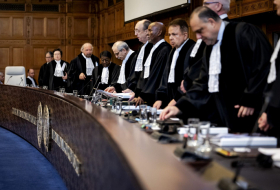Her comments, after a nightmare conference speech that she admitted was “uncomfortable”, were backed up by the Conservative leader in Scotland, Ruth Davidson, who warned: “People serve in cabinet entirely at the pleasure of the prime minister.”
Davidson stressed that Johnson had made a public show of loyalty, but urged May to ensure that the foreign secretary was true to his word.
“He has come out this week to say he is fully behind every dot, comma, and word of the Florence speech,” Davidson told the BBC’s Andrew Marr Show. “I want to see the prime minister hold him to that.”
Davidson described Johnson as a “big intellect and big figure in the party”, adding that the prime minister had her support if she believed he was the best person to be foreign secretary.
But in a warning that appeared to be aimed both at cabinet members and Grant Shapps – whose attempted coup fizzled out after a backlash from colleagues – Davidson claimed colleagues had forgotten that they were lucky to be serving the country. “It is not and should never be about private ambition.”
She added that “lying in wait [is Jeremy Corbyn’s] neo-Marxist government ready to take over”.
In further signs of angst within the party between the most ardent Brexit supporters and those who campaigned for remain, the Tory MP Nadine Dorries told ITV’s Peston on Sunday she believed it was wrong to focus on Johnson.
She said May should sack her chancellor, Philip Hammond, arguing that any attempt to put the brakes on Brexit would not be forgiven by voters.
Davidson disagreed, telling Robert Peston that May should “absolutely not” remove her chancellor, and arguing that it was his job to set out how different Brexit outcomes would affect the British economy.
Davidson refused to say whether she would want to run to become a Tory MP in 2022, opening the door to the possibility of becoming a future leader. Asked about the issue, she said: “I’ve got a job at the moment. I’m not looking beyond 2021.” Davidson argued that she was focused on making the party in Scotland a credible alternative government, insisting: “This is my job right now.”
Meanwhile the former Tory prime minister John Major launched a blistering attack on “self absorbed and, frankly, disloyal behaviour” within his party over recent weeks.
He strongly criticised those who had tried to manoeuvre against May. “Their conduct has undermined their own party, their own prime minister, and their own government. It is profoundly unbecoming and it must stop,” he wrote in the Mail on Sunday, claiming the public were desperate for the government to speak for them.
“The British people are sick and tired of the navel-gazing that has dominated the news headlines, all of which has been deeply unedifying to behold.”
May’s comments, in an interview with the Sunday Times, are part of an effort to get on to the front foot as MPs return to parliament this week after a damaging conference season.
After days of Johnson dominating the headlines, the prime minister finished the week with a speech that was overshadowed by a prankster handing her a P45, an incessant cough and a problem with the staging.
Asked if she could move the foreign secretary in an expected reshuffle, after claims that he was unsackable, she said: “It has never been my style to hide from a challenge and I’m not going to start now.
“I’m the PM, and part of my job is to make sure I always have the best people in my cabinet, to make the most of the wealth of talent available to me in the party.”
The prime minister denied that she had cried after the speech and hit out at some of the media portrayals of her. “One minute journalists are accusing me of being an ice maiden or a robot, then they claim I’m a weeping woman in dire need of a good night’s sleep,” she told the newspaper. “The truth is, my feelings can be hurt, like everyone else, but I am pretty resilient.”
She admitted the speech was an “uncomfortable” time but said she never considered abandoning the address. “I am not someone who gives up,” she said.
The prime minister will be relieved that a decision by Downing Street to out Shapps as a figurehead of a potential coup attempt shut down any rebellion, as the vast majority of MPs turned on him for disloyalty.
Johnson intervened by claiming that those hoping to take on the prime minister were “nutters” but did suggest that MPs had “sniffed the air” before an outpouring of loyalty.
“Are we really going to be stampeded myopically over the edge of the gorge, with an election that no one wants?” he wrote in a Sunday Telegraph article.
“Quo quo scelesti ruitis? as Horace put it at the beginning of a fresh bout of Rome’s ghastly civil wars, and which roughly translates as: what do you think you are doing you nutters?
“From what I can see the Tory herd has refused to be so goaded. We have sniffed the air and turned sensibly away from the cliff.”
However, there were claims that three serving cabinet ministers had discussed May’s future on Thursday – the day after her disastrous speech. And a number of other MPs have told the Guardian that they believe she should go.
Meanwhile, the prime minister attracted sympathy from opposition leaders. The SNP’s Nicola Sturgeon told Andrew Marr she felt sorry for the prime minister, but that did not obscure the central problem for May.
Speaking at the start of her party conference in Glasgow, she said: “The problem for Theresa May is she is a very weak prime minister presiding over a deeply divided party. It’s a massive problem for the country at the moment, and for the livelihood and living standards of everyone in the country.”
Sturgeon dismissed claims by May that she and Davidson, the Scottish Tory leader, had “saved the union” in June’s election after the Tories won 13 seats in Scotland, helping cut the Scottish National party’s constituencies from 56 to 35.
Brexit and the Tories’ disarray was making the case for independence more and more compelling, Sturgeon said. “I think that the case becomes greater and stronger by the day,” she added.
More about:
















































